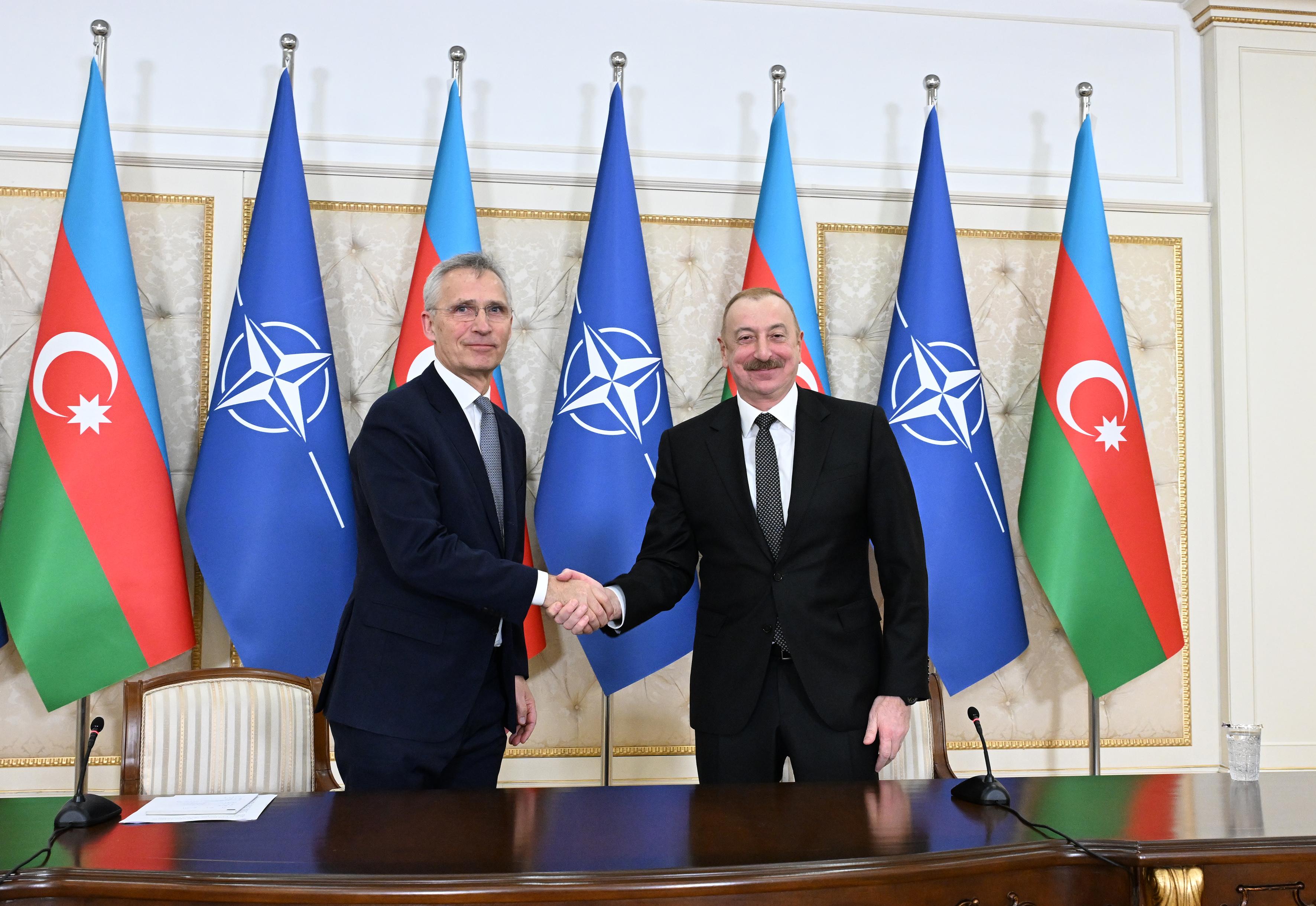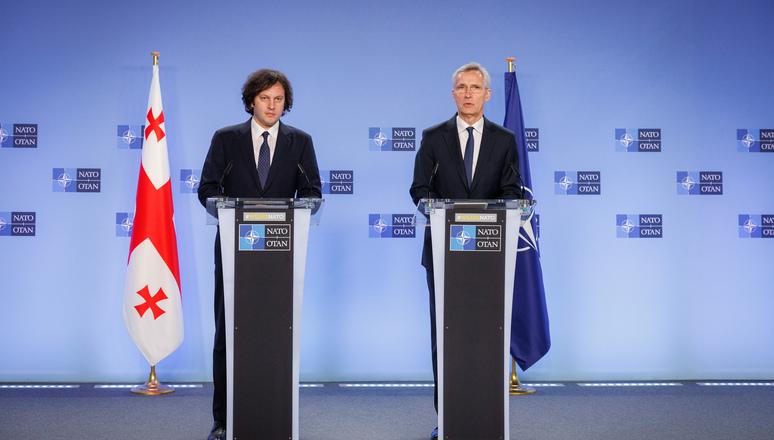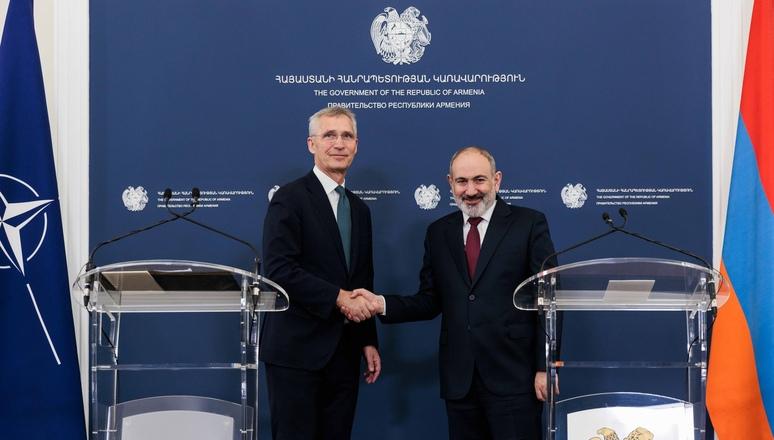Azerbaijan, Georgia, & Armenia's strategic engagements with NATO & regional dynamics Balancing geopolitical realities
Amidst evolving regional dynamics, Azerbaijan, Georgia, and Armenia are strategically engaging with NATO while navigating complex geopolitical realities. Stoltenberg's recent tour of the South Caucasus highlighted the importance of these countries in NATO's strategic calculus. As they seek to bolster partnerships and address regional challenges, their engagements underscore the intricate balance of interests at play in the region.
Azerbaijan's strategic engagement with NATO
Against the backdrop of evolving geopolitical dynamics in the South Caucasus, Azerbaijan's recent engagement with NATO, as exemplified by the visit of Secretary General Jens Stoltenberg to Baku, underscores the country's strategic importance in regional security and energy dynamics.

Stoltenberg's visit, part of his tour of the South Caucasus, marked a significant step in Azerbaijan's efforts to deepen its ties with NATO and articulate its strategic priorities on the international stage.
Central to the discussions in Baku was Azerbaijan's pivotal role in the energy landscape of Europe. With Azerbaijan emerging as one of the top suppliers of pipeline gas to Europe, the country's significance in ensuring energy security for NATO allies cannot be overstated. Stoltenberg's recognition of Azerbaijan's role as an energy supplier reflects the increasing interdependence between energy security and geopolitical stability in the region.
Moreover, Azerbaijan's aspirations to become a net exporter of electricity to Black Sea European nations by 2030 further solidify its strategic importance in shaping the energy landscape of the wider region. Jens Stoltenberg's acknowledgement of Azerbaijan's energy ambitions underscores the mutual benefits of cooperation between NATO and Azerbaijan in the energy sector.
Beyond energy cooperation, the secretary general's visit also highlighted Azerbaijan's strategic objectives in the realm of security and conflict resolution. Baku’s efforts to rebuild and develop its recently liberated territories following the Second Karabakh War constitute a significant aspect of its foreign policy agenda. The estimated investment needs for reconstruction, coupled with the imperative of landmine clearance, underscore Azerbaijan's determination to consolidate its territorial integrity and ensure stability in the region.
In this context, Azerbaijan seeks NATO's support in both reconstruction efforts and landmine clearance, recognizing the potential contributions of NATO structures to these endeavors. Azerbaijan's emphasis on constructive engagement with NATO reflects its commitment to regional stability and conflict resolution through diplomatic means.
Stoltenberg's discussions in Baku also touched upon the broader regional dynamics, including Azerbaijan's relations with Armenia and its humanitarian support for Ukraine amidst the ongoing conflict with Russia. Azerbaijan's balanced approach to regional conflicts, coupled with its humanitarian assistance to Ukraine, underscores its commitment to promoting stability and security beyond its immediate neighborhood.
Furthermore, Azerbaijan's cautious approach to regional security challenges, such as the intensified military-technical cooperation between Tehran and Moscow, reflects its strategic calculus in navigating complex geopolitical dynamics. While Azerbaijan acknowledges the need for regional cooperation, particularly in countering common security threats, it remains steadfast in safeguarding its national interests and sovereignty.
Overall, Stoltenberg's visit to Baku signifies the deepening of Azerbaijan's engagement with NATO and its proactive role in shaping regional security dynamics. As Azerbaijan continues to pursue its strategic objectives on the international stage, its partnership with NATO serves as a cornerstone of its broader foreign policy agenda aimed at promoting stability, security, and economic development in the South Caucasus and beyond.
NATO chief’s strategic visit to Georgia
NATO Secretary-General Jens Stoltenberg's recent three-day tour of the South Caucasus countries has brought into sharp focus the evolving geopolitical landscape in the region. After his engagements in Azerbaijan, Stoltenberg proceeded to Tbilisi, where he held discussions with Prime Minister Irakli Kobakhidze and President Salome Zurabishvili. The significance of his visit to Georgia cannot be overstated, given the country's strategic position and its aspirations for closer ties with the transatlantic alliance.

At the core of Stoltenberg's discussions in Tbilisi was NATO's steadfast support for Georgia's territorial integrity. Against the backdrop of simmering tensions in the breakaway regions of Abkhazia and South Ossetia, Stoltenberg reiterated NATO's unwavering commitment to Georgia's sovereignty and territorial integrity. In a pointed denunciation of Russia's actions, Stoltenberg condemned the staging of presidential elections in these occupied territories, dismissing them as illegitimate manoeuvres that undermine regional stability and exacerbate existing conflicts.
Moreover, Stoltenberg lauded Georgia as one of NATO's closest allies in the region, underscoring the strategic partnership between the alliance and the South Caucasus nation. Georgia's contributions to NATO-led missions and its alignment with Western values and security interests have solidified its status as a key partner in the Euro-Atlantic community. Stoltenberg's affirmations of Georgia's significance within NATO's strategic calculus signal a deepening of cooperation and engagement between the alliance and the country.
Beyond geopolitical posturing, Stoltenberg emphasized the imperative of democratic reforms and transparent elections in Georgia. As the cornerstone of Western democratic values, credible electoral processes are essential for fostering stability, legitimacy, and good governance. Stoltenberg's endorsement of democratic principles underscores NATO's broader commitment to promoting democratic norms and institutions in partner countries, thereby bolstering regional stability and resilience against external pressures.
However, Stoltenberg's visit to Georgia also underscores the complex interplay of geopolitical dynamics in the region. Georgia's aspirations for NATO membership and closer integration with Western institutions have long been a sore point in its relations with Russia, which views NATO enlargement in its neighborhood as a threat to its strategic interests. Against this backdrop, Stoltenberg's affirmations of support for Georgia are likely to further exacerbate tensions with Moscow, potentially fueling existing geopolitical rivalries in the region.
Moreover, Stoltenberg's visit comes at a critical juncture for Georgia, as the country grapples with internal challenges and external pressures. The ongoing conflict in Ukraine, Russia's assertive posture in the Black Sea region, and the broader geopolitical competition between Russia and the West underscore the complex security environment facing Georgia. Stoltenberg's assurances of NATO's support are therefore timely and significant, offering Georgia a sense of reassurance amidst mounting uncertainties.
Looking ahead, Stoltenberg's visit to Georgia is likely to have far-reaching implications for the country's security, stability, and geopolitical trajectory. As Georgia navigates the complexities of regional geopolitics, its partnership with NATO remains a linchpin of its security architecture. The secretary-general’s reaffirmation of NATO's support sends a clear message to both internal and external stakeholders: Georgia's strategic significance is recognized and its aspirations for Euro-Atlantic integration remain firmly on NATO's agenda.
Armenia's strategic pivot
Armenia's geopolitical landscape has undergone significant shifts in recent years, with the country increasingly seeking to expand its partnerships and deepen its engagement with international allies. Prime Minister Nikol Pashinyan's remarks during a joint briefing with NATO Secretary General Jens Stoltenberg on March 19 underscore Armenia's commitment to enhancing its collaboration with NATO and its individual members, amidst evolving regional dynamics.

Pashinyan's emphasis on developing the existing political dialogue and expanding partnerships with NATO reflects Armenia's strategic imperative to strengthen its resilience and defense capabilities. The proposed Individual Adapted Partnership Plan signals Armenia's willingness to engage with NATO on mutually beneficial terms, without necessarily seeking membership in the alliance. Against the backdrop of regional challenges and global instability, Armenia recognizes the importance of bolstering its defense potential and actively participating in peacekeeping activities, such as its continued involvement in the NATO peacekeeping mission in Kosovo.
Furthermore, Armenia's commitment to regional stability is evident in its policy of "regionalization," which prioritizes constructive relations with neighboring countries, including Georgia and Iran. Pashinyan's articulation of Armenia's vision for peace and stability in the region, particularly in its relations with Azerbaijan, underscores the country's willingness to engage in dialogue and pursue diplomatic solutions based on principles of mutual recognition and respect for sovereignty.
Armenia's proposals for confidence-building measures with Azerbaijan, including a mirror withdrawal of troops and mutual arms control, highlight its commitment to fostering trust and de-escalating tensions in the region. However, the lack of a positive response from Baku underscores the challenges inherent in achieving lasting peace and reconciliation.
Moreover, Armenia's efforts to improve relations with Turkey, based on agreements reached in 2022, signal a willingness to explore avenues for cooperation and dialogue in the South Caucasus region. By engaging with NATO and other international partners, Armenia seeks to leverage its strategic position and pursue initiatives that contribute to peace, stability, and economic development in the region.
At the heart of Armenia's engagement with NATO lies a commitment to reforming its armed forces and enhancing its defense capabilities. Pashinyan's assurance that the reform process is not directed against any specific country underscores Armenia's defensive posture and its focus on safeguarding its territorial integrity.
Stoltenberg's tour of the South Caucasus underscores NATO's recognition of the region's strategic importance and its commitment to enhancing cooperation with regional partners. As Armenia navigates the complex geopolitical dynamics of the South Caucasus, its engagement with NATO and other international allies will play a pivotal role in shaping its future trajectory and ensuring regional stability.
Forging partnerships for regional stability
In conclusion, Stoltenberg's tour of the South Caucasus underscores NATO's recognition of the region's strategic importance and the alliance's commitment to enhancing cooperation with Azerbaijan, Georgia, and Armenia.
As these countries navigate complex geopolitical dynamics, their engagements with NATO serve as pivotal steps towards promoting stability, security, and prosperity in the region.








